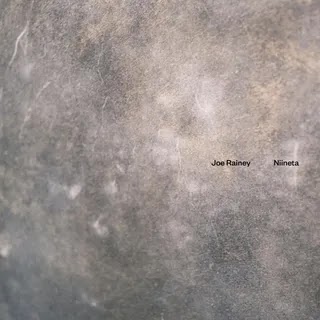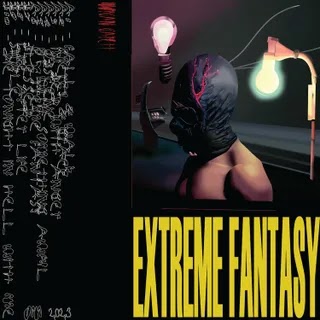The debut album from the Midwestern pow wow singer is arresting and unruly, centering his remarkable voice amid blasts of digital distortion, field recordings, and unrelenting rhythms.
“No chants,” the title of the fierce and propulsive fifth track on Joe Rainey’s debut album Niineta, carries a double meaning. On one hand, it can be interpreted as a defensive posture, taken on behalf of pow wow singers like him against any outsider who might paint their musical tradition as simplistic by labeling it “chanting” as opposed to singing. But the phrase also has a more playful origin—adopted as a homonym, Rainey has said, for the catchphrase and theme song of Vince McMahon, the love-to-hate-him chief executive of World Wrestling Entertainment: no chance. As in, you’ve got no chance in hell.
The double entendre is emblematic of Rainey’s sensibility: a member of the Red Lake Ojibwe people raised not on the Red Lake Reservation but 270 miles south, in Minneapolis, whose upbringing involved Ojibwe culture and pro wrestling both, and whose musical resume thus far includes stints in several celebrated pow wow ensembles—known as drums, a term that for the Ojibwe refers to the percussion instrument as well as the groups of singers who congregate around it—and guest spots on albums by Chance the Rapper and Bon Iver. Niineta is at once rooted in tradition and deeply idiosyncratic, fusing pow wow melodies with the timbres and rhythms of the 21st-century city: techno, industrial, hip-hop, dub, noise.
Listeners unfamiliar with pow wow could do worse for a starting point than Rainey’s own SoundCloud page, where he hosts the field recordings he has been making of intertribal competitions and other performances since he was eight years old. Even without the avant-garde accouterments of Niineta, it is arresting, unruly music. Accompanied only by each other and the insistent beating of the drum, singers weave wordlessly in and out of unison and counterpoint, sometimes ecstatic, sometimes baleful, conveying the meaning of a given song—which may involve honoring deceased relatives, celebrating tribal pride, or simply encouraging bystanders to dance—without verbal language. The emphasis on movement, and the steady rhythmic pulse, make pow wow a surprisingly natural fit for integration with the club, as Rainey and producer Andrew Broder demonstrate on Niineta, turning the pounding of a rawhide drum head into an unrelenting four-on-the-floor throb.
Rainey’s remarkably flexible voice sits at Niineta’s center, alternately consoling and foreboding, sometimes deep and gravelly and others high and androgynous. Backed by ascending strings on “b.e. son,” he sounds strong but weary, like he’s encouraging comrades in the midst of battle. At the end of “easy on the cide,” he breaks from a croon into a yelp, sounding, for a moment, a little like Young Thug. Broder’s production, punctuating magisterial instrumental arrangements with explosive digital distortion, recalls recent albums by Bon Iver and Low—another star in Rainey’s midwestern constellation of past collaborators—as well as Kanye West’s Yeezus. Like those artists, Rainey and Broder have no fealty to any particular recording fidelity, freely mixing the hiss and grain of iPhone voice memos with the blistering high definition of contemporary electronic music, treating the capture of the sound itself as one more malleable and expressive element of their work.
They sample liberally from Rainey’s library of pow wow recordings, a choice that enriches Niineta on multiple levels. Most obviously, it opens up the music to other voices, simulating the sort of togetherness—“that pow wow feeling,” as Rainey has called it—that might arise from a traditional performance. But they also adhere to the surface qualities of those field recordings, leaving the samples rough around the edges and highlighting the marginalia of a given performance as much as the music itself. They make room for stray sounds: introductory speeches from the singers, whoops of approval for the audience. As an outsider to Ojibwe culture, live recordings like Rainey’s might be the closest one ever comes to a genuine pow wow; Niineta both enshrines and subverts these recordings, asserting the power and presence of the singers while reminding us that an encounter mediated by earbuds or laptop speakers is still miles away from the real thing.
More than its glitchy digital production, Niineta’s greatest departure from traditional pow wow singing may be its use of chord changes to underpin its melodies. Songs like “bezhigo” and “ch 1222” are full of dramatic shifts that would be near-impossible in pow wow’s customary drum-and-voices setup, contextualizing Rainey’s vocal lines in a way that may make their emotional contours more legible to listeners who are accustomed to music with roots in Europe. Amid the clamor of “easy on the cide,” there are moments that feel as stately and triumphant as a power ballad. At first, I was mildly suspicious of this gilding, wondering whether it flattened the music’s impact, dressing it up as something else. I still prefer the album’s more percussion-driven tracks, like “no chants” and “phil’s offering,” which seem, to me, to allow Rainey’s melodies more freedom to wander where they will. But upon further listening, I came to view the adoption of European-style harmony as its own sort of subversion. Rainey has emphasized in interviews and press materials that Niineta is not intended to speak for Ojibwe music at large, but rather, to vocalize the perspective of one musician who “[wasn’t] from the rez, but [was] repping them.” If you grew up with one foot in a culture that has historically ignored you, stolen from you, attempted to eradicate you—why not take a few of their tricks for yourself?
















thnks
ReplyDeleteM2M Sim Card come in more solid shapes than you’ll discover in classic customer SIMs, which are planned for cell phones. Even though these conventional SIMs work in M2M or IoT gadgets, they’re outlined for typical, ordinary utilize and may not hold up in harsher working situations.
ReplyDelete